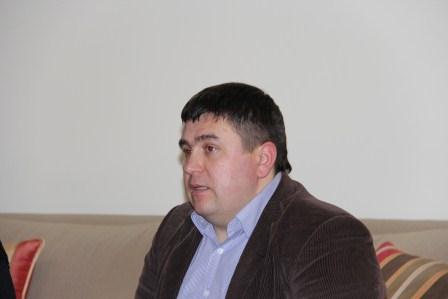The screening of the documentary "The cause of death is «–» ", telling about the death penalty in Belarus, was held within the frames of the discussion.The authors of the film sought to show the audience the procedure of punishment and the suffering of the relatives of those who had been sentenced to death.The main character of the film is the mother of Andrei Zhuk who was executed in March 2010. Sviatlana Zhuk learned about the death of her son while passing him a parcel. It was not accepted, and the guard only said: “Do not look for him anywhere. He departed on sentence”. Then Sviatlana Zhuk understood that her son had been executed. Such unclear formulations, as well as the overall lack of information about the circumstances of the executions give birth to various rumours, noted Andrei Paluda, the coordinator of the campaign "Human Rights Defenders against the Death Penalty".
After the screening of the film there was a discussion with the coordinator of the campaign "Human Rights Defenders against the Death Penalty" Andrei Paluda and Liubou Kavaliova (right), the mother of Uladzislau Kavaliou, who was executed for Minsk metro bombing.
with the coordinator of the campaign "Human Rights Defenders against the Death Penalty" Andrei Paluda and Liubou Kavaliova (right), the mother of Uladzislau Kavaliou, who was executed for Minsk metro bombing.
Liubou Kavaliova told about the circumstances of the case of Dzmitry Kanavalau and Uladzislau Kavaliou, who were charged with organizing terrorist attacks: the lawyers were prevented from reaching their clients for a long time, the accused were tortured and the trial caused reasonable doubts among human rights defenders and the Belarusian society.Thus, almost 50,000 of Internet users voted for leaving the suspects alive. But this fact never influenced the destiny of Dzmitry and Uladzislau, who were executed by shooting in March 2012.
In her struggle for her son’s life Liubou Kavaliova passed all possible instances in Belarus. She repeatedly appealed personally to Aliaksandr Lukashenka, requiring an objective consideration of the criminal case. Mrs. Kavaliova also appealed to the international instances. The Human Rights Committee of the United Nations decided that the right to life and legal defence, the presumption of innocence and a fair trial and the right to judicial review were violated by the Belarusian authorities in Uladzislau Kavaliou’s case.
"Liubou Kavaliova is quite a unique person in this respect – she fought hard for  the rights of her son. Through her living evidence people can feel the depth and perspective of the issue. It is always hard for Mrs. Kavaliova to speak about it, but the people who hear such evidence, begin to look differently, understand that this doesn’t happen somewhere far away and any person can get in such a situation," said the coordinator of the campaign " Human Rights Defenders against the Death Penalty" Andrei Paluda.
the rights of her son. Through her living evidence people can feel the depth and perspective of the issue. It is always hard for Mrs. Kavaliova to speak about it, but the people who hear such evidence, begin to look differently, understand that this doesn’t happen somewhere far away and any person can get in such a situation," said the coordinator of the campaign " Human Rights Defenders against the Death Penalty" Andrei Paluda.
Mr. Paluda (left) also presented the activities  of the company and noted the role of such events in the struggle for the abolition of the death penalty in Belarus: "It is not only the problem of Belarus. Belarus is geographically in the center of Europe and is a kind of bloody spot on the map of Europe. In order to make the continent free of the death penalty, it should be discontinued in Belarus. An important part in the struggle for its abolition is work at the international level. International opinion and international negotiations have a great influence and play a significant role in our activity.”
of the company and noted the role of such events in the struggle for the abolition of the death penalty in Belarus: "It is not only the problem of Belarus. Belarus is geographically in the center of Europe and is a kind of bloody spot on the map of Europe. In order to make the continent free of the death penalty, it should be discontinued in Belarus. An important part in the struggle for its abolition is work at the international level. International opinion and international negotiations have a great influence and play a significant role in our activity.”
***
According to the international human rights organization Amnesty International, about 400 people were executed in Belarus since 1991. Belarus hasn’t officially published statistics on the number of executions, although, being a member of the OSCE, it is obliged "to provide public information regarding the use of the death penalty".
Related articles
10 October – World Day against the Death Penalty




